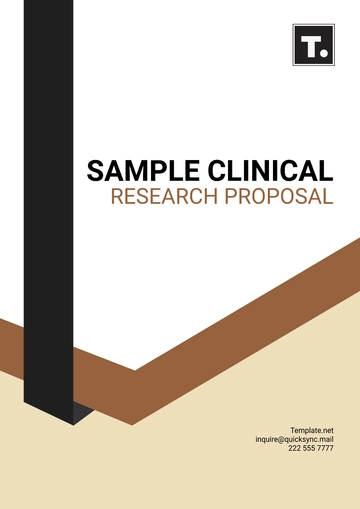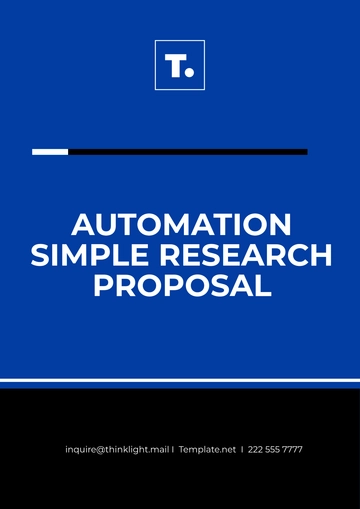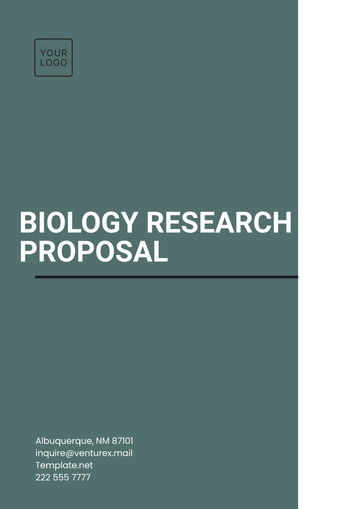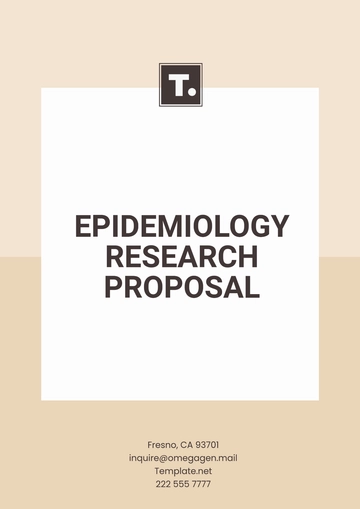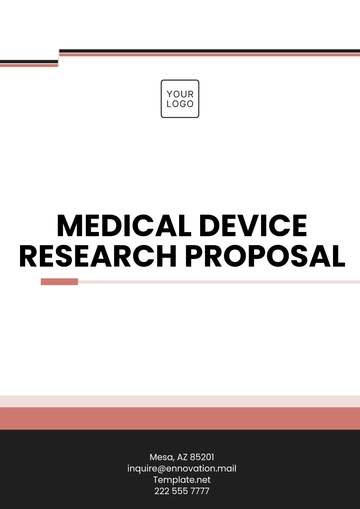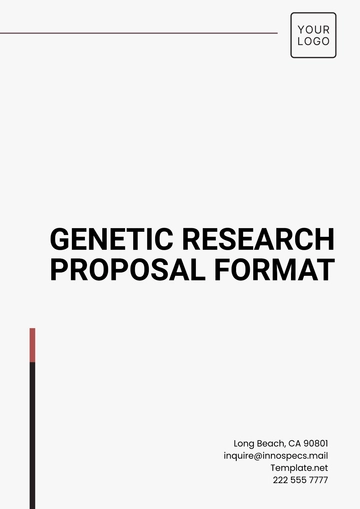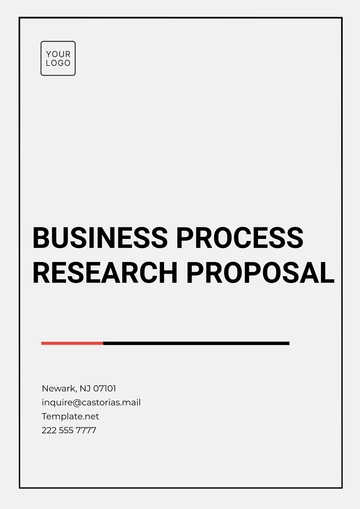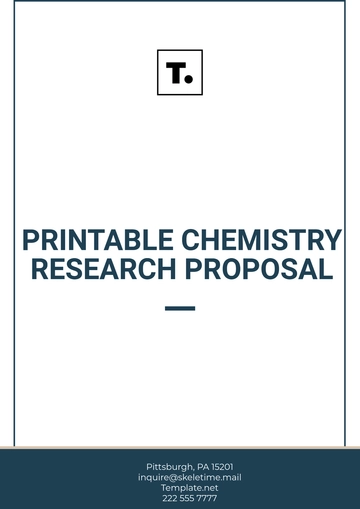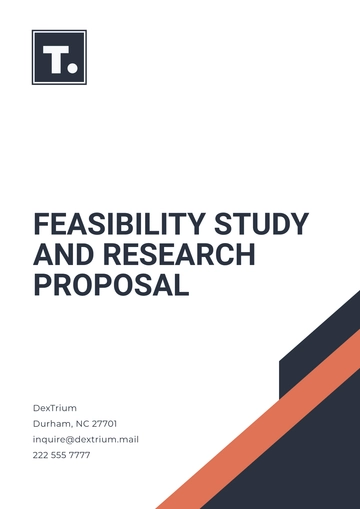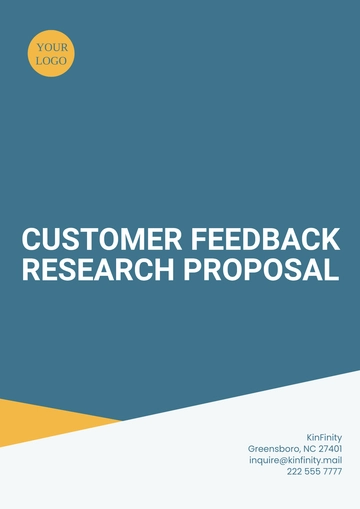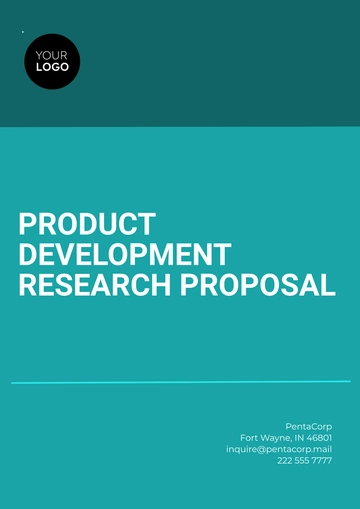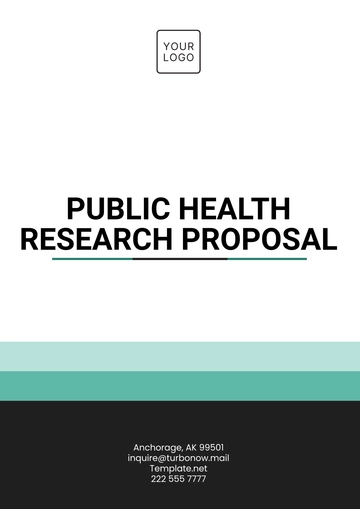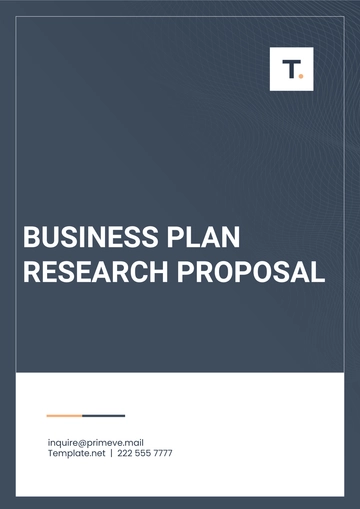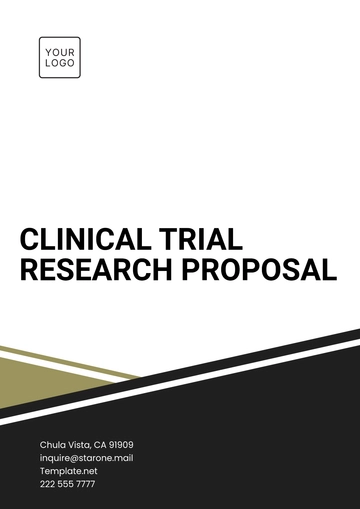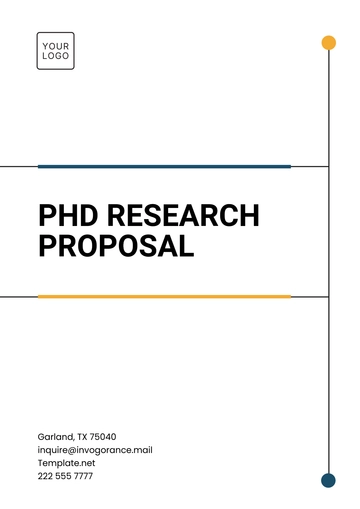Free Biomedical Research Proposal
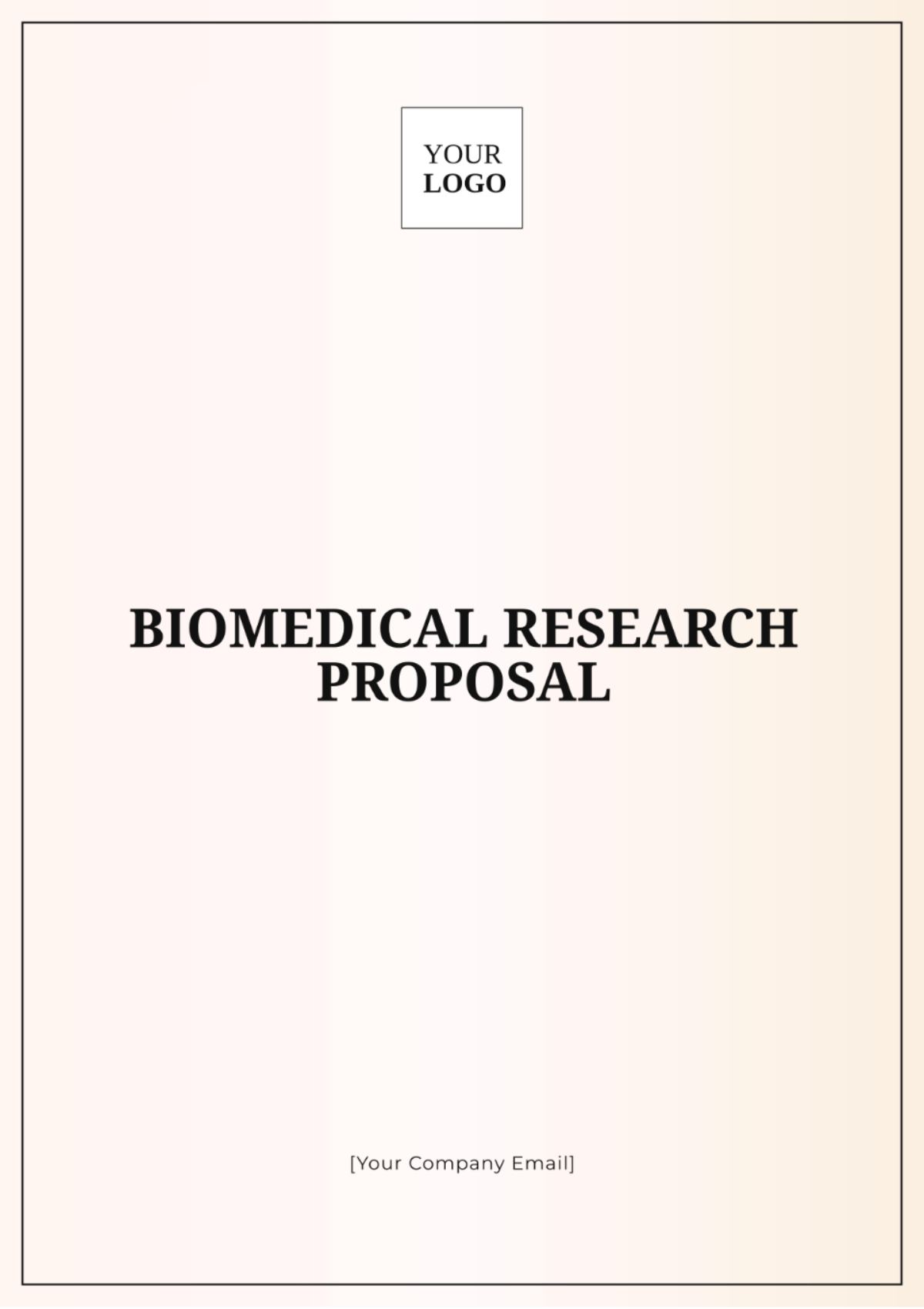
Prepared By: [YOUR NAME]
Date: [DATE]
I. Abstract
This research aims to examine the efficacy of a novel biomedical treatment for chronic inflammatory diseases through a double-blind, randomized controlled trial to assess its impact on inflammatory markers compared to standard therapy, expecting to reveal both primary and secondary health benefits and provide a comprehensive understanding of the treatment's overall effects.
II. Introduction
A. Background
Chronic inflammatory diseases, including rheumatoid arthritis and Crohn's disease, affect millions of individuals worldwide. Current treatments often involve long-term medication with significant side effects. Recent advancements in biomedical research suggest that molecular-targeted therapies could offer more effective and safer alternatives.
B. Problem Statement
The primary issue is the limited efficacy and adverse side effects of current treatments for chronic inflammatory diseases. This study aims to address these issues by evaluating a new therapeutic intervention.
C. Literature Review
Several studies have investigated various biological pathways involved in inflammation. However, there remains a gap in the research concerning the effectiveness of newly identified molecular targets. Past research by Smith et al. (2050) highlights the potential of targeting specific proteins, which our study intends to build upon.
III. Objectives
A. Primary Objective
The objective is to ascertain the effectiveness of the novel biomedical intervention in diminishing the levels of inflammatory markers.
B. Secondary Objectives
The goal is to rigorously evaluate the new intervention's safety profile, analyzing all risks, adverse effects, and outcomes to ensure compliance with safety standards.
To conduct a comprehensive assessment of the overall health improvements experienced by patients who are currently undergoing the new medical treatment.
Hypotheses
H1: The newly introduced intervention leads to a substantial reduction in inflammatory markers when compared to the effects observed with the standard treatment.
H2: The newly introduced intervention exhibits a reduced incidence of adverse side effects when compared to the side effects associated with the existing standard treatment.
IV. Methodology
A. Research Design
A trial will be performed where both the participants and the researchers are unaware of who is receiving the treatment and who is receiving a placebo, with participants being randomly assigned to a treatment or control group to eliminate bias in the results.
B. Sample Population
The plan is to recruit a total number of 200 participants for this study, all of whom have been diagnosed with different chronic inflammatory diseases. These participants will be selected from a variety of different healthcare centers to ensure a diverse and representative sample for our research.
C. Data Collection Methods
Proceed with administering both the initial blood test and the follow-up blood tests to evaluate and continuously monitor the levels of inflammatory markers within the patient's body.
Questionnaires that are specifically created to assess and quantify the results or effects as directly reported or communicated by the patients themselves.
D. Analysis Plans
Data will be analyzed using statistical software. Primary outcomes will be evaluated using ANCOVA, while secondary outcomes will be assessed using logistic regression models.
V. Significance and Impact
The proposed research could significantly advance the treatment of chronic inflammatory diseases by providing a more effective and safer alternative to current therapies. The broader implications include reducing healthcare costs and improving the quality of life for millions affected by these conditions.
VI. Budget and Resources
Item | Description | Cost (USD) |
|---|---|---|
Personnel | Research team salaries: principal investigators, research assistants, and administrative support. | 100,000 |
Equipment | Costs for acquiring laboratory equipment, including analytical instruments and computers. | 50,000 |
Reagents | Expenses for experimental materials and reagents. | 25,000 |
Data Analysis | Fees for software licenses, data storage, and computational resources for research analysis. | 20,000 |
Miscellaneous | Miscellaneous expenses including travel, participant reimbursements, and unforeseen costs that may arise during the research process. | 5,000 |
Total Budget: 200,000 USD
VII. Timeline
Phase | Duration | Description |
|---|---|---|
Lit Review & Proposal Development | 3 months | Identify gaps, draft the proposal, and secure approvals. |
Recruitment and Baseline Collection | 6 months | Recruit 200 participants, screen for eligibility, collect informed consent, and gather baseline data. |
Intervention Implementation | 12 months | Administer treatment/placebo, monitor participants, ensure adherence, and manage any issues. |
Follow-Up Data Collection | 6 months | Gather follow-up data, including blood tests, questionnaires, and long-term monitoring. |
Data Analysis and Report Writing | 3 months | Analyze data, interpret results, and prepare research reports with drafts for publication and presentations. |
Total Duration: 30 months
VIII. References
Smith, J., Doe, R., & Johnson, A. (2050). Advances in Molecular Targets for Inflammation. Journal of Biomedical Research, 15(3), 345-367.
Williams, L., & Carter, M. (2058). Current Trends in Chronic Inflammatory Disease Treatments. Medical Science Review, 22(4), 412-426.
Brown, T. L., & Green, P. (2056). Efficacy of Targeted Biological Therapies. Clinical Medicine, 29(2), 198-210.
- 100% Customizable, free editor
- Access 1 Million+ Templates, photo’s & graphics
- Download or share as a template
- Click and replace photos, graphics, text, backgrounds
- Resize, crop, AI write & more
- Access advanced editor
Advance your biomedical research with our Biomedical Research Proposal Template from Template.net. This editable and customizable template is designed to help you effectively communicate your research goals, experimental design, and potential implications in the biomedical field. Editable in our AI Editor Tool, it allows you to personalize the template to match your research focus.
You may also like
- Research Proposal
- Proposal Request
- Project Proposal
- Grant Proposal
- Photography Proposal
- Job Proposal
- Budget Proposal
- Marketing Proposal
- Branding Proposal
- Advertising Proposal
- Sales Proposal
- Startup Proposal
- Event Proposal
- Creative Proposal
- Restaurant Proposal
- Blank Proposal
- One Page Proposal
- Proposal Report
- IT Proposal
- Non Profit Proposal
- Training Proposal
- Construction Proposal
- School Proposal
- Cleaning Proposal
- Contract Proposal
- HR Proposal
- Travel Agency Proposal
- Small Business Proposal
- Investment Proposal
- Bid Proposal
- Retail Business Proposal
- Sponsorship Proposal
- Academic Proposal
- Partnership Proposal
- Work Proposal
- Agency Proposal
- University Proposal
- Accounting Proposal
- Real Estate Proposal
- Hotel Proposal
- Product Proposal
- Advertising Agency Proposal
- Development Proposal
- Loan Proposal
- Website Proposal
- Nursing Home Proposal
- Financial Proposal
- Salon Proposal
- Freelancer Proposal
- Funding Proposal
- Work from Home Proposal
- Company Proposal
- Consulting Proposal
- Educational Proposal
- Construction Bid Proposal
- Interior Design Proposal
- New Product Proposal
- Sports Proposal
- Corporate Proposal
- Food Proposal
- Property Proposal
- Maintenance Proposal
- Purchase Proposal
- Rental Proposal
- Recruitment Proposal
- Social Media Proposal
- Travel Proposal
- Trip Proposal
- Software Proposal
- Conference Proposal
- Graphic Design Proposal
- Law Firm Proposal
- Medical Proposal
- Music Proposal
- Pricing Proposal
- SEO Proposal
- Strategy Proposal
- Technical Proposal
- Coaching Proposal
- Ecommerce Proposal
- Fundraising Proposal
- Landscaping Proposal
- Charity Proposal
- Contractor Proposal
- Exhibition Proposal
- Art Proposal
- Mobile Proposal
- Equipment Proposal
- Student Proposal
- Engineering Proposal
- Business Proposal
